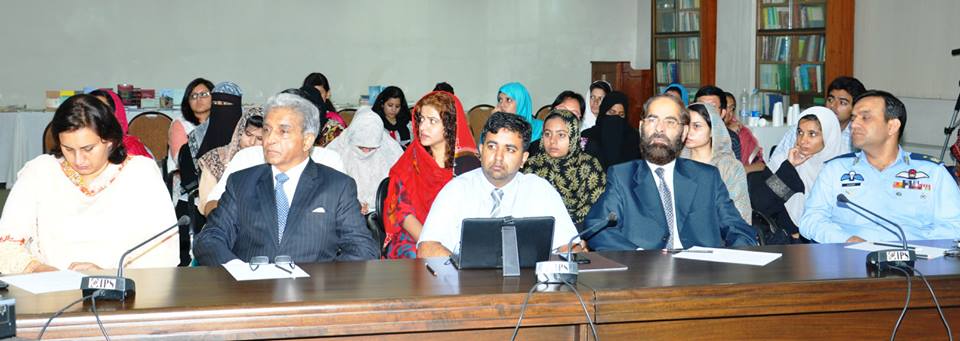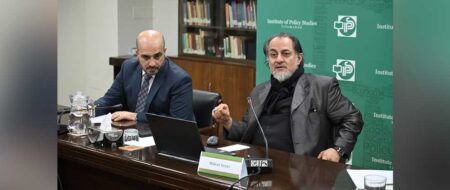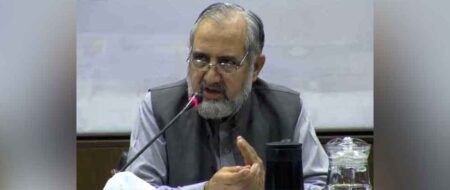IPS Seminar: Maritime awareness for Pakistan must to exploit potential – Experts
Islamabad (September 5, 2013) Experts, in a seminar organized by Institute of Policy Studies, termed lack of maritime awareness as one of the top most challenges Pakistan is faced with to exploit the innumerous opportunities the country’s 295,000 kilometers of marine area offers.
The seminar titled “Pakistan: Maritime challenges and opportunities” was aimed at “promoting the awareness through intellectual discourse and to enable policy makers to address all different dimensions of the topic”, in the words of senior IPS associate commander (R) Azhar Ahmad, who moderated the event.
The seminar was chaired by Prof. Dr. Pervaiz Iqbal Cheema, Dean, Faculty of Contemporary Studies (FCS), National Defense University. The speakers included Vice Admiral (r) Iftikhar Rao, former deputy chief of Naval Staff (Operations) and Dr. Muhammad Khan, Head, Deptt of Int’l Relations, National Defence University, Islamabad. It was attended by a number of maritime and defense experts, armed forces officials, representatives of concerned ministries and government departments, and academics.
Vice Admiral (R) Iftikhar Ahmad Rao in his keynote address emphasized that Pakistan needed to update and further develop its maritime policy of 2002 and take into account the recent trends and developments.
He said that Pakistan’s maritime areas consisted of 295,000 square kilometers and thus had to be considered as the largest and richest ‘province’ of the country to tap its real potential.
Underlining the significance of trade, mineral and strategic maritime potential he reminded that world’s 97 percent and Pakistan’s 95 percent trade takes place through sea.
Pakistan is located at a point which lies just besides the route of world’s 72 percent oil supplies. Gwadar port needs to be equipped with necessary technology and infrastructure so that it may not only become a starting point for an economic corridor towards China but also provide an ideal location for the empty oil tankers entering the Gulf before reloading for necessary repair and maintenance, he suggested.
He called for integration between maritime and inland transport systems, development of corridors and enhanced logistic solutions to take full benefit of country’s maritime potential.
 |
 |
Rao vehemently advocated that Pakistan should emerge as a shipbuilding country as this industry has proven to be a catalyst of industrialization in a number of countries which have deep sea shore and abundant labor force.
“The strategy has already been approved and a policy board with the prime minister as its chairman has already been notified since 2007 while a real development is yet to be seen”, he noted.
He also stressed the need for meaningful diplomatic efforts to counter the hegemonic designs of India to dominate the Indian Ocean, which it strategically considers “India’s ocean”.
He revealed that the strategic islands of Nicobar and Andaman had 80 per cent Muslim population at the time of Partition but the rule of Muslim majority areas to become part of Pakistan was not applied to them mainly because they were not even claimed for by the political leadership of Indian Muslims. Today, India has a three-star naval command based on these two islands through which it controls China’s maritime movement by its neck!
Dilating upon the strategic vision, he said that Pakistan have to have a second strike capability through a seaborne facility of using nuclear weapons.
Dr. Muhammad Khan, who heads the department of international relations at the National Defence University, said that by all counts Pakistan qualifies to become a bonafide maritime nation.
Talking about the challenges to the maritime interests of Pakistan he mentioned the Indo-US plan to establish Indian control over Indian ocean and undermine Pakistan’s economic and strategic interests. He, however, noted that longstanding problem of Sir Creek between Pakistan and India was no more a dispute and almost everything seemed to be settled at technical level.
“It is merely the political will which is required to strike a deal”, he told.












